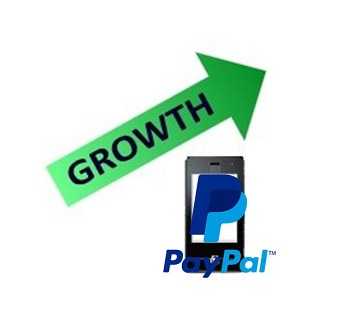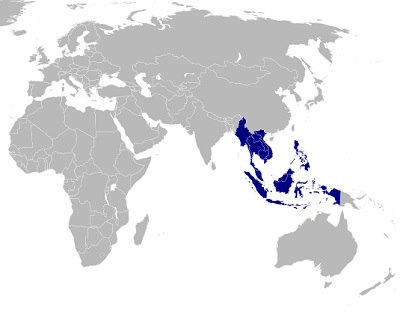The mobile space is driving the evolution of commerce as a whole
It has been 10 years since PayPal launched its first mobile payments service. To celebrate the anniversary of the service, the company has released information to show its exponential growth over its long history. This information is visualized in a chart that was released by PayPal earlier this week. According to PayPal CEO Dan Schulman, the mass adoption of mobile commerce has created a significant shift in the way people spend money. This has begun to change the nature of commerce with consumers relying more heavily on the digital space.
$66 billion in mobile transactions were processed by PayPal in 2015
According to PayPal, one-third of the 4.9 billion payments processed by the company last year were made through mobile devices. This accounts for some $66 billion in mobile transactions. The company believes that the growing prominence of mobile payments services will lead to a change in the commerce space over the next decade. This change may accelerate as more businesses begin supporting mobile transactions and shoppers relying on their smartphones and tablets.
Global mobile payments could reach $4 trillion by 2020
 In the United States, mobile commerce exceeded $100 billion in transactions in 2014. These transactions have continued to grow since, with more consumers becoming comfortable with the prospect of using mobile devices to make purchases. By 2020, mobile transactions could reach more than $4 trillion globally, according to IDC, a market research and analysis firm. With new payment services becoming more secure, more consumers are likely to participate in the mobile commerce space, giving PayPal and other companies new opportunities to expand their mobile initiatives.
In the United States, mobile commerce exceeded $100 billion in transactions in 2014. These transactions have continued to grow since, with more consumers becoming comfortable with the prospect of using mobile devices to make purchases. By 2020, mobile transactions could reach more than $4 trillion globally, according to IDC, a market research and analysis firm. With new payment services becoming more secure, more consumers are likely to participate in the mobile commerce space, giving PayPal and other companies new opportunities to expand their mobile initiatives.
Improved security makes consumers more comfortable with mobile commerce
Consumer adoption of mobile commerce has been heavily influenced by the security and convenience of payment services. Many had consider mobile transactions to be risky as they believed their financial information would be exposed to theft and exploitation. Indeed, some services have been impacted by major data breaches in the past, but these events have served to strengthen security in recent years, making mobile payments more attractive to consumers.
More consumers are opting to shop via mobile devices
Mobile commerce is beginning to see aggressive growth in Southeast Asia. The Asia Pacific region has become one of the most attractive and fastest growing mobile payments markets in the world, with companies from all over the world flocking to the region to take advantage of this fact. A new report from Criteo shows that Southeast Asia, in particular, is seeing significant growth in terms of mobile shopping and the availability of mobile payment services. This is partly due to consumers becoming more comfortable with the basic concept of mobile commerce.
Report shows that mobile shopping is growing in many Southeast Asian countries
The report from Criteo shows that mobile payments account for approximately 40% of all transactions made among digital retailers. In the fourth quarter of 2015, mobile transactions accounted for 25% of all payments being made in the digital space, with countries like India, Singapore, and Thailand experiencing the strongest growth in mobile payments. Among mobile shoppers, smartphones where the favored purchasing platform.
Smartphones have become the favored shopping platform among consumers
 Smartphone purchases accounted for approximately 73% of all mobile commerce sales in Southeast Asia. Tablets accounted for only 27% of these transactions. Consumers had favored tablet devices in the past because of the larger screens that these devices feature. The shopping experience was also relatively more enjoyable than what consumers experienced with smartphones, as retailers had developed services that performed better on tablets. Now, however, consumers are favoring smartphones because of their small size and how much more convenient they are when compared to tablet devices.
Smartphone purchases accounted for approximately 73% of all mobile commerce sales in Southeast Asia. Tablets accounted for only 27% of these transactions. Consumers had favored tablet devices in the past because of the larger screens that these devices feature. The shopping experience was also relatively more enjoyable than what consumers experienced with smartphones, as retailers had developed services that performed better on tablets. Now, however, consumers are favoring smartphones because of their small size and how much more convenient they are when compared to tablet devices.
Security remains one of the greatest concerns that mobile shoppers have
While mobile commerce is growing quickly in Southeast Asia, many consumers remain concerned about the security of their financial information when making mobile purchases. As mobile shopping becomes more popular, hackers are beginning to target this sector in order to gain access to consumer financial information. Retailers and companies responsible for mobile payment services have been addressing security issues in order to secure the continued growth of the mobile commerce space.
 In the United States, mobile commerce exceeded $100 billion in transactions in 2014. These transactions have continued to grow since, with more consumers becoming comfortable with the prospect of using mobile devices to make purchases. By 2020, mobile transactions could reach more than $4 trillion globally, according to IDC, a market research and analysis firm. With new payment services becoming more secure, more consumers are likely to participate in the mobile commerce space, giving PayPal and other companies new opportunities to expand their mobile initiatives.
In the United States, mobile commerce exceeded $100 billion in transactions in 2014. These transactions have continued to grow since, with more consumers becoming comfortable with the prospect of using mobile devices to make purchases. By 2020, mobile transactions could reach more than $4 trillion globally, according to IDC, a market research and analysis firm. With new payment services becoming more secure, more consumers are likely to participate in the mobile commerce space, giving PayPal and other companies new opportunities to expand their mobile initiatives.
 Smartphone purchases accounted for approximately 73% of all mobile commerce sales in Southeast Asia. Tablets accounted for only 27% of these transactions. Consumers had favored tablet devices in the past because of the larger screens that these devices feature. The shopping experience was also relatively more enjoyable than what consumers experienced with smartphones, as retailers had developed services that performed better on tablets. Now, however, consumers are favoring smartphones because of their small size and how much more convenient they are when compared to tablet devices.
Smartphone purchases accounted for approximately 73% of all mobile commerce sales in Southeast Asia. Tablets accounted for only 27% of these transactions. Consumers had favored tablet devices in the past because of the larger screens that these devices feature. The shopping experience was also relatively more enjoyable than what consumers experienced with smartphones, as retailers had developed services that performed better on tablets. Now, however, consumers are favoring smartphones because of their small size and how much more convenient they are when compared to tablet devices.